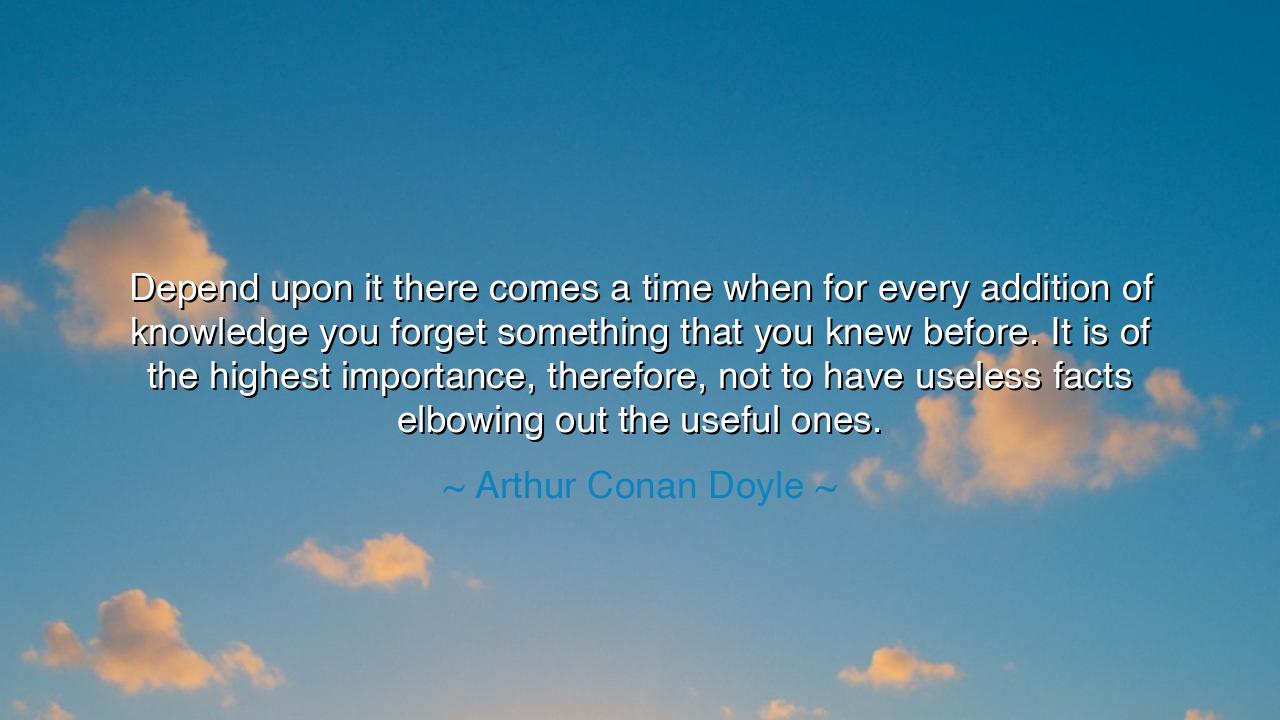
Depend upon it there comes a time when for every addition of
Depend upon it there comes a time when for every addition of knowledge you forget something that you knew before. It is of the highest importance, therefore, not to have useless facts elbowing out the useful ones.






“Depend upon it there comes a time when for every addition of knowledge you forget something that you knew before. It is of the highest importance, therefore, not to have useless facts elbowing out the useful ones.” — Arthur Conan Doyle
Listen, O seeker of wisdom, to these words of Arthur Conan Doyle, spoken through the immortal voice of his creation, Sherlock Holmes, the keen-eyed detective whose mind was a temple of precision. In this saying, Doyle, through Holmes, reveals a truth as old as thought itself — that knowledge, though powerful, must be cultivated with care and discernment. The human mind, vast yet finite, is like a storeroom: what fills it shapes its usefulness. If one crowds it with useless facts, they drive out the useful ones, and the brilliance of thought becomes a clutter of trivia. Thus, Doyle warns us not against learning, but against learning without purpose — against the vanity of collecting knowledge that serves neither truth nor wisdom.
The origin of this quote lies in A Study in Scarlet (1887), where young Dr. Watson marvels at the breadth of Holmes’s ignorance about the solar system — for Holmes does not even know that the Earth orbits the sun. To this, Holmes replies that he intends to forget it at once, for it bears no relevance to his work as a detective. “What the deuce,” he says, “is it to me?” It was not arrogance, but discipline of mind — a lesson that true intelligence is not about knowing everything, but knowing what to know. Doyle, in giving these words to his detective, taught not only the art of reasoning but the art of selection — that the mind must be trained to value clarity over clutter, and purpose over pride.
Think of the human mind as a library. A wise librarian does not fill every shelf with random books, but arranges knowledge according to use. If the shelves are crowded with noise, the book one truly needs cannot be found. So it is with thought. The man who learns endlessly but without aim is like a sailor who gathers maps of every sea yet never sails any one of them well. Knowledge becomes his burden, not his power. But the one who seeks knowledge as a craftsman gathers tools — each sharp, chosen, and in its place — becomes a master of his art. For it is not the possession of knowledge that gives strength, but the wise ordering of it.
This truth is seen in every age. Consider Leonardo da Vinci, who studied nature, science, and art not to hoard facts, but to discover the unity within them. His notebooks overflowed with wonder, yet every observation served a purpose — the perfection of understanding. Contrast him with the scholars of his day who memorized ancient texts without question, praising the dust of old knowledge while ignoring the living world before them. Their minds, heavy with useless facts, forgot the living truth. Thus, Leonardo soared where others stumbled — for his curiosity was disciplined, his mind a forge, not a museum.
And yet, Doyle’s warning bears deeper meaning still. He speaks not only to scholars, but to all who live in the age of noise — an age where information pours endlessly like a flood upon the soul. The modern mind is filled with the trivial: names, numbers, distractions that flash and vanish. We know much, but understand little. We remember statistics, but forget compassion; we learn news, but lose wisdom. This, too, is the forgetting Doyle foresaw — the tragedy of a mind so busy collecting, it forgets how to think. Knowledge, unguided by reflection, becomes its own oblivion.
The lesson, then, is this: guard the sanctuary of your mind. Do not allow the trivial to drive out the profound. Ask yourself, before you learn, before you speak, before you act — “Will this serve my purpose? Will this deepen my understanding or cloud it?” Choose what you keep, as the gardener chooses which plants to nourish. Let your thoughts grow in order, not in chaos. For wisdom is not measured by the size of one’s library, but by the clarity of one’s insight.
So, my child, heed the counsel of the detective and the philosopher alike: seek knowledge with purpose, and guard your mind from clutter. Forget not that learning is a sacred art — a journey not to know everything, but to know what matters. For every fact that enters your mind, another may fade. Choose, then, what you will remember. Let the useful truths — those that feed your work, your soul, and your goodness — remain steadfast, and let the rest fall away like dust in the wind. Thus shall your mind remain clear, your understanding deep, and your wisdom eternal.






AAdministratorAdministrator
Welcome, honored guests. Please leave a comment, we will respond soon